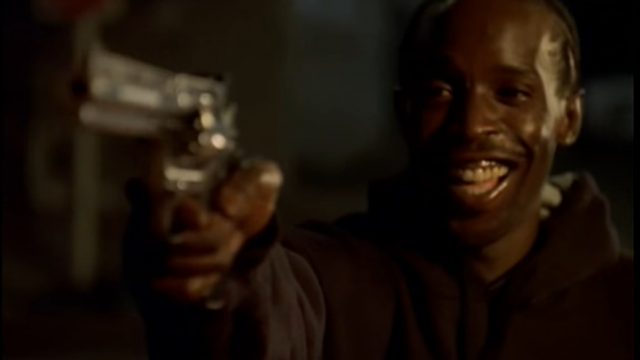“I wonder what you gotta do to get thrown off this police force.”
“Keep on with some of your shit, you just might find out.”
It’s difficult to write about The Wire, especially the first season, because my process normally involves untangling my emotional reaction, and when it comes to this show I find myself wanting to talk about not just my initial reaction to the series, or even my reaction on rewatch, but the way my memories of the first season changed as I got further into the show. The Wire is universally considered the greatest television show ever (and considered around here as definitely, like, top five), and part of that comes from the way it’s perceived as blowing up the police procedural genre, but that doesn’t fully capture why the affect of the series. The action is brutally realistic, showing the systems and step-by-step processes of both police work and drug dealing, but to my eye it doesn’t so much blow up the mythology of the police procedural as it expands it.
At the centre of the show, we have Detective James “Jimmy” McNulty, about as archetypal a police procedural protagonist as you can get, he who Gets Results You Stupid Chief, and what makes him unique in terms of genre is that he captures the spirit of Dirty Harry without breaching real world plausibility (he has a reasonable understanding of the considerable amount of paperwork). In terms of archetypes, McNulty can be seen as a combination of Moral Crusader and Competent Professional, someone who wants the right thing to get done, and knows how to do it through his job. And the first way the show expands the police procedural is to double him in D’Angelo “D” Barksdale, a mid-level drug dealer in the Barksdale empire. Normally, someone in D’Angelo’s position would just be ‘the drug dealer’, but the show gives him his humanity by giving him just as much archetypal power as McNulty; D’Angelo is smart and he is moral, he’s just working in a different system to the detective, with different rules and different stakes.
From there, people on all different levels are imbued with some archetypal power. Avon Barksdale, head of the empire, is the most obvious, the Noble King who uses his status to create and improve his community – it’s clearest with the basketball game he presides over, but my favourite moment is him giving the nod to Wallace for his role in capturing a stick-up man who targeted his dealers. He’s too high up to talk to Wallace directly, but he’s willing to acknowledge the boy’s existence to encourage him and others like him. You also have Omar Little, stick-up artist who is a literal Robin Hood, robbing drug dealers and giving his spoils to the poor and homeless (I also like the idea that he’s another version of McNulty whose loyalty isn’t to a particular institution, but to the very concept of an institution – the Game). Within the police force itself are a few classic archetypes, as well as further doubling of McNulty – like Lester Freamon, an older version of McNulty who went through all this shit thirteen years and four months ago, and learned from the experience.
These archetypes are deployed in a complex, but ultimately straightforward dramatic structure. It’s about ten times more complex than The Shield, but the basic idea is the same, decisions at each level bouncing off each other as things roll out, though it’s difficult to see, especially on first watch when an action is thrown at you before the motivation behind it is explained, but it’s there and creates a power and drive that’s less visible in the show as it goes on and picks up characters – there are still cases of small actions having massive unexpected consequences, but there are no more situations like when Greggs gets shot, which happen because of the decisions of everyone on every level, and come back on everyone immediately.
The overall effect is an emotional explanation for how systems like these manage to function next to the technical one – it isn’t just that these systems can make us rich and powerful, it’s that they can fashion us into icons and myths that have existed for thousands of years. This first season doesn’t demolish the police procedural myth, it uses parts from it to create a new myth, the myth of the Game, of Kings leading Soldiers in a vast network of battles. This is the groundwork for the rest of the show, pulling apart the very myth it creates for us.


